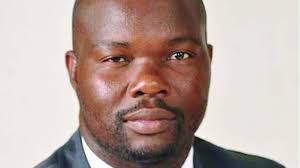Mnangagwa Security causes chaos at Johane Marange church gathering

SECURITY: President Mnangagwa heavily guarded
There was tension on Saturday at the Johane Marange Apostolic Church, St Noah Mafararikwa Shrine in Bocha, Mutare in Manicaland province, as President Emmerson Mnangagwa’s extensive security detail invaded the shrine ahead of his attendance.
The presence of the dreaded Central Intelligence Organisation (CIO) operatives, who gave strict seating instructions to congregants, created an atmosphere of discomfort and unease.
Mnangagwa, who travels with over 30 security personnel, arrived at the shrine accompanied by Defence Minister Oppah Muchinguri and Youth Minister Tino Machakaire.
This heavy-handed approach mirrors that of his predecessor, Robert Mugabe, whom Mnangagwa ousted in a military coup.
Like Mugabe, Mnangagwa has adeptly utilised the church as a tool to consolidate power, manipulate elections, and obscure a litany of corruption, bad governance, and human rights abuses.
This unholy alliance has not only compromised the sanctity of religious institutions but also eroded the democratic fabric of the nation.
Mnangagwa’s regime has systematically co-opted religious leaders and institutions, turning them into instruments of political propaganda.
By aligning himself with influential church figures, Mnangagwa seeks to project an image of piety and moral authority.
This strategy is particularly evident during election periods, where church events are transformed into political rallies.
Religious leaders endorse Mnangagwa and urge their congregations to support his party, Zanu-PF.
The manipulation of religious platforms for political gain extends to outright election rigging.
There are several reports of church leaders being bribed or coerced into promoting Mnangagwa’s candidacy and discouraging dissent.
Congregants are often subjected to sermons emphasising obedience and loyalty to the ruling party, with subtle or overt threats of divine retribution for opposing Mnangagwa.
This exploitation of faith creates a coercive environment where voters feel morally obligated or fearfully compelled to support the regime.
While Mnangagwa presents himself as a devout leader, his administration is marred by rampant corruption and mismanagement.
High-profile corruption scandals involving top government officials are routinely downplayed or dismissed, with religious rhetoric used to distract the populace.
By framing political critiques as attacks on a godly leader, Mnangagwa deflects scrutiny and fosters a culture of impunity within his government.
Human rights abuses under Mnangagwa’s regime are well-documented, from the brutal crackdown on protesters to the silencing of opposition voices through intimidation and violence.
Yet, through his association with the church, Mnangagwa attempts to mask these atrocities.
Religious gatherings often feature prayers for peace and stability, implicitly suggesting that support for Mnangagwa is synonymous with national harmony.
This manipulation not only undermines genuine calls for justice and accountability but also places religious institutions in the service of oppression.
The complicity of some church leaders in Mnangagwa’s schemes raises serious ethical concerns.
While many religious figures genuinely believe they are promoting peace and stability, their actions inadvertently legitimise an oppressive regime.
Conversely, those who resist government co-optation face harassment and persecution, highlighting the perilous position of religious institutions in Zimbabwe’s political landscape.
Mnangagwa’s strategic use of the church to rig elections and conceal his administration’s corruption, bad governance, and human rights abuses represents a profound betrayal of both democratic values and religious sanctity.
This unholy alliance not only threatens the integrity of Zimbabwe’s political process but also undermines the moral authority of the church, leaving a nation in desperate need of genuine reform and accountability.




